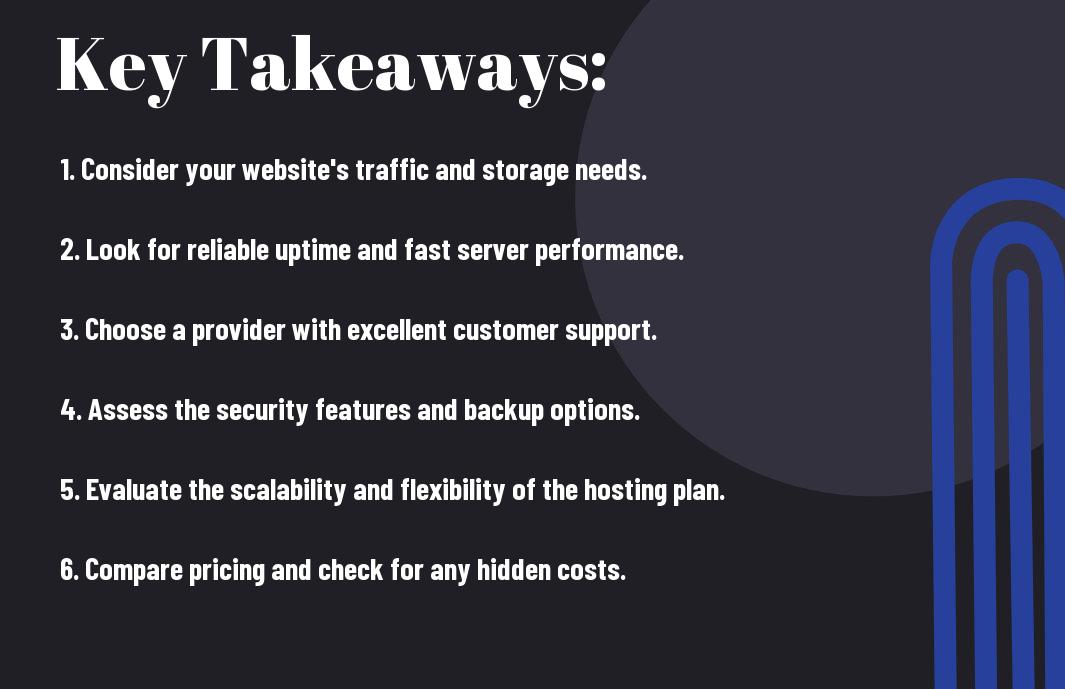Are you struggling to find the perfect web hosting solution for your technology blog? Choosing the right web hosting provider is crucial for the success of your blog. With so many options available, it can be overwhelming to make a decision. From uptime reliability to security features, there are key factors to consider to ensure that your blog is in safe hands. In this blog post, we will discuss the most important aspects to keep in mind when selecting the best web hosting for your technology blog, so you can make an informed decision and maximize the potential of your online platform.
Key Takeaways:
- Understand your blog’s technical requirements: Before choosing a web hosting provider, analyze your blog’s technical needs such as bandwidth, storage, and functionality to ensure the provider can meet these requirements.
- Consider the level of support and reliability: Look for a web hosting provider that offers 24/7 technical support and has a reliable uptime track record to minimize website downtime and related issues for your technology blog.
- Compare different hosting options: It’s essential to compare different web hosting options to find the best fit for your technology blog, considering factors such as cost, scalability, security features, and user-friendliness of the hosting platform.

Understanding Web Hosting Basics
Clearly, the first step in choosing the best web hosting for your technology blog is understanding the basics of web hosting. To get a comprehensive overview of web hosting, you can read The Ultimate Guide To Web Hosting. This guide covers essential topics such as how web hosting works, different types of web hosting services, and tips for choosing the right web host for your needs.
Types of Web Hosting Services
When it comes to web hosting, there are several types of services to consider, including shared hosting, VPS hosting, dedicated hosting, and cloud hosting. Each type offers different levels of performance, security, and scalability. Any businesses or large-scale websites typically opt for dedicated hosting due to their high traffic volumes and need for complete control over server resources. This information is broken down into the table as follows:
| Type of Hosting | Features |
| Shared Hosting | Low cost, limited resources, ideal for small websites |
| VPS Hosting | Virtual private server, better performance and scalability than shared hosting |
| Dedicated Hosting | Full control over server resources, high performance, ideal for large-scale websites |
| Cloud Hosting | Scalable and reliable, pay-as-you-go pricing model |
Any personal blogs or small businesses with limited resources can start with shared hosting and upgrade as the website grows.
Bandwidth and Storage Needs
When considering the best web hosting for your technology blog, you should assess your bandwidth and storage needs based on your monthly traffic volumes and content size. A higher amount of bandwidth allows for more visitors to access your blog without slow load times or downtime. Additionally, the storage capacity will determine how much content you can host on your website, including images, videos, and downloadable files.
Evaluating Web Hosting Features for Technology Blogs
For a technology blog, choosing the right web hosting service is crucial to the success and performance of your website. There are specific features and considerations you need to take into account when evaluating web hosting options for your technology blog.
Uptime and Reliability
When it comes to a technology blog, uptime and reliability are paramount. You want your audience to have access to your content at all times without any downtime. Look for a web host that offers a high uptime guarantee, preferably 99.9% or higher. Additionally, ensure that the web host has a strong track record for reliability, with redundant systems and backup plans in place to minimize any potential downtime.
Scalability and Growth Potential
As your technology blog grows, scalability and growth potential will become increasingly important. You’ll want a web hosting service that can accommodate the increasing traffic and resource needs of your expanding audience. Look for a web host that offers scalable hosting plans, allowing you to easily upgrade your resources as needed. Additionally, consider a web host that provides additional features such as content delivery networks (CDNs) and caching systems to help optimize the performance of your website as it grows.

Technical Considerations and Support
After you have considered the hosting options based on the type of technology blog you are running, it is important to delve into the technical considerations and support offered by the web hosting providers. In this section, we will discuss the importance of technical support and customer service, as well as backup and security features to keep your technology blog running smoothly.
Technical Support and Customer Service
When it comes to running a technology blog, you may encounter technical issues that require immediate attention. This is why it is crucial to choose a web hosting provider that offers reliable technical support and excellent customer service. Look for a hosting provider that offers 24/7 customer support through various channels such as live chat, phone, and email. Additionally, check for user reviews and ratings to gauge the quality of their customer service. Responsive technical support and customer service can be a lifesaver when dealing with any hosting-related issues.
Backup and Security Features
Ensuring the safety and security of your technology blog is paramount. Look for a web hosting provider that offers regular backups of your website data to avoid any loss in case of technical issues or cyber attacks. Additionally, robust security features such as SSL certificates, malware scanning, and DDoS protection are essential to safeguard your technology blog from potential threats. Prioritize web hosts that offer these features as part of their hosting packages to maintain the integrity of your blog.
You can find more detailed information and tips on how to choose the best web hosting for your technology blog in our blog post How to Choose the Hosting for Your Blog: Expert Tips.
Making the Right Financial Decision
Now that you have a clear understanding of your hosting needs, it’s time to make the right financial decision when choosing the best web hosting for your technology blog. While it’s tempting to go for the cheapest option available, it’s important to consider the long-term implications of your choice. Choosing the right web hosting provider is an investment in the success of your blog.
Analyzing Cost vs. Value
When it comes to web hosting, it’s essential to analyze the cost versus the value you are getting. While a low-cost hosting option may seem attractive at first, it’s important to consider the impact it could have on the performance and security of your blog. Investing in a reliable hosting provider may cost more upfront, but the long-term value it provides in terms of uptime, security, and support can outweigh the initial investment.
Understanding the Pricing Structures
It’s crucial to understand the different pricing structures offered by web hosting providers. Some providers may offer a low introductory rate, only to significantly increase the price upon renewal. Others may offer tiered pricing based on the features and resources you need. Be sure to carefully review the pricing structures and terms of service to avoid any surprises down the road.
Conclusion
Taking this into account, choosing the best web hosting for your technology blog is a crucial decision that will ultimately impact the success and performance of your website. By considering factors such as speed, security, uptime, and customer support, you can ensure that your technology blog is hosted on a platform that meets your specific needs and provides a reliable foundation for your online presence. Additionally, understanding the different types of web hosting options, such as shared, VPS, and dedicated hosting, can help you make an informed decision that aligns with your blog’s growth and scalability. By carefully evaluating these aspects, you can confidently select the best web hosting for your technology blog and set yourself up for long-term success in the online world.
FAQ
Q: Why is choosing the best web hosting important for a technology blog?
A: Choosing the best web hosting is crucial for a technology blog because it affects the site’s speed, uptime, security, and overall performance. It impacts user experience and SEO rankings.
Q: What factors should I consider when choosing web hosting for my technology blog?
A: When choosing web hosting for your technology blog, consider factors such as uptime reliability, speed, security features, customer support, scalability, and specific technologies supported (e.g., PHP, MySQL, etc.).
Q: What is the difference between shared hosting, VPS hosting, and dedicated hosting for a technology blog?
A: Shared hosting is a cost-effective option where multiple websites share resources on a single server. VPS hosting provides dedicated resources within a shared environment, offering more control and scalability. Dedicated hosting provides an entire server solely for your website, offering the highest level of performance and control, but at a higher cost.
Q: How does the location of the web hosting server impact a technology blog?
A: The server’s location can impact the website’s performance and load times, especially for an international audience. Choosing a server location that is closer to the majority of your audience can improve the site’s speed and overall user experience.
Q: What are some recommended web hosting providers for a technology blog?
A: Some recommended web hosting providers for a technology blog include SiteGround, Bluehost, A2 Hosting, and HostGator. These providers offer a range of hosting options, excellent performance, and reliable customer support tailored to the needs of a technology blog.
CATEGORY:Uncategorized

